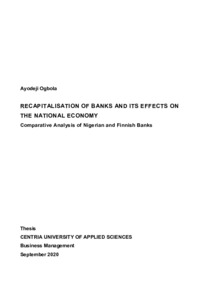Recapitalisation of banks and its effects on the national economy : Comparative Analysis Of Nigerian And Finnish Banks
Ogbola, Ayodeji (2020)
Ogbola, Ayodeji
2020
All rights reserved. This publication is copyrighted. You may download, display and print it for Your own personal use. Commercial use is prohibited.
Julkaisun pysyvä osoite on
https://urn.fi/URN:NBN:fi:amk-2020102821739
https://urn.fi/URN:NBN:fi:amk-2020102821739
Tiivistelmä
Recapitalization is one of the trending issues when it comes to studies and research pertaining to finance. The drive for banks to revitalize their capital base in order to improve their balance sheet has grown over the years as crises upon crises have erupted due to one financial downturn or the other, causing distress in the financial sectors of a nation. The revitalization of the banking system in a bid to save it from bankruptcy or any financial embarrassment centers on the bank’s ability to reorganize its approaches and strength so as to be revived from such financial crisis.
From the comparative analysis done on the effects of recapitalization on the national economy of Finland and Nigeria, it can be deduced that recapitalization has produced positive effects on the economy of both countries by increasing the return on assets, return on equity, net profit ratio, capital investment ratio and basic earnings per share, thereby helping in the reduction of operating cost, enhancement of available fund, investment possibilities of international standard, prospecting of generating more funds from the Stock Exchange Market and adequacy of cash mobilization strategy.
Recapitalization is a correlate of national development which is spurred from the various economic modalities put in place by the government through the promulgation of banking policies that will help sustain and improve the national economy significantly.
From the comparative analysis done on the effects of recapitalization on the national economy of Finland and Nigeria, it can be deduced that recapitalization has produced positive effects on the economy of both countries by increasing the return on assets, return on equity, net profit ratio, capital investment ratio and basic earnings per share, thereby helping in the reduction of operating cost, enhancement of available fund, investment possibilities of international standard, prospecting of generating more funds from the Stock Exchange Market and adequacy of cash mobilization strategy.
Recapitalization is a correlate of national development which is spurred from the various economic modalities put in place by the government through the promulgation of banking policies that will help sustain and improve the national economy significantly.
